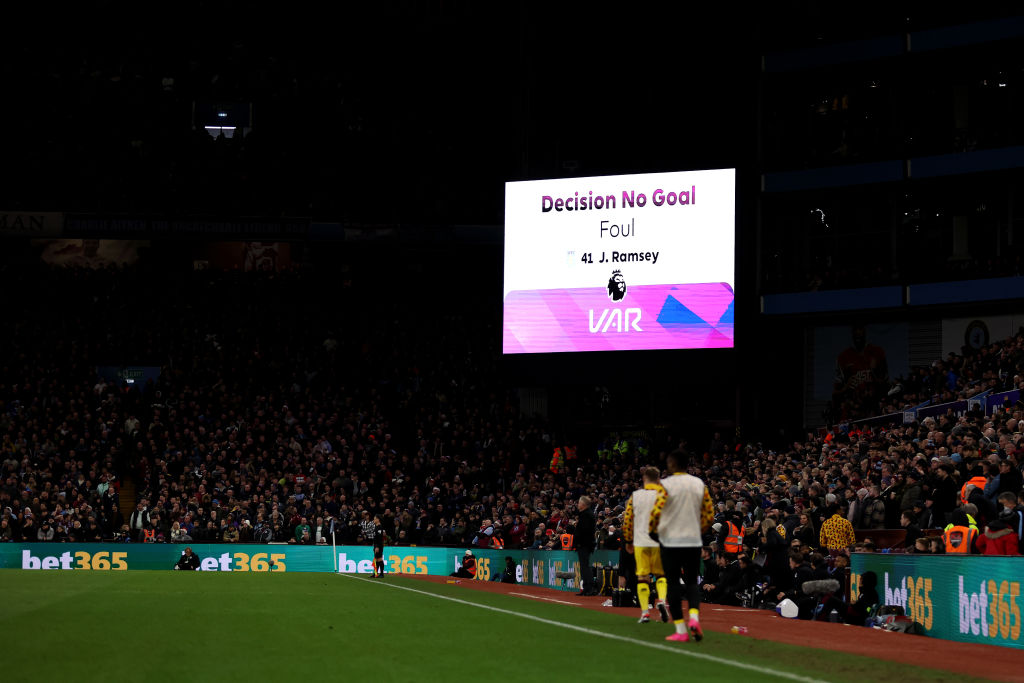The Premier League’s 20 football clubs will vote tomorrow on whether to scrap video assistant referee (VAR) technology. Five years ago, when it was first introduced, VAR was heralded as a foolproof system. Sneaky handballs, unfair red cards, onside-offside mix-ups: all would be gone. The refereeing would be perfect. But, even after five years, VAR is still too slow and its decision-making too opaque. It’s wrong, too. There have been around 20 game-changing errors every season since its introduction. Football can’t continue in this state.
Wolverhampton Wanderers forced the vote, claiming VAR had ‘damaged the relationship between football and fans’. They’re right. VAR ruins the spontaneity of goal celebrations and slows down the game. Matches are routinely stopped for several minutes as officials struggle to reach a verdict. It’s no surprise that, following the introduction of VAR, match time added at the end of games has increased to, at times, a ridiculous 11 and a half minutes.
However, there’s a cynical element to Wolves’ protest. The club has had seven incorrect VAR calls go against them this season and only one in their favour, the worst record in the Premier League. Clubs with a similar deficit see the vote as an opportunity to get rid of VAR, believing that it unduly punishes their performances, Wolves finished 14th this season – mid-table mediocrity – and they want to do better.
For many clubs like Wolves, big victories in a season don’t occur often. It’s fair for their fans to be outraged when a VAR error strips their team of a memorable win. The feeling is almost universal: 95 per cent of fans say that the current VAR process ruins the spontaneity of the sport and is unnecessarily long. Many pundits agree: ‘Let referees ref it and understand they will make mistakes,’ said Wayne Rooney recently. A further nine-in-ten fans of lower league teams are opposed to the system being imposed on them due to it slowing the game. They’ve seen the chaos VAR has caused the top league and would prefer to stick with the status quo.
But this misses the point. The issue is not VAR itself, but how officials have implemented it, and run the system. Premier League bosses insist that VAR has been objectively effective; it’s increased the proportion of correct decisions from 82 per cent to 96 per cent. But there’s a fallacy in their logic: this reasoning assumes all decisions are objective, whereas many rely on the referee’s subjective interpretations of the laws of the game. There’s no catch-all solution, after all, for a small tug on a players’ shirt, the ball glancing a hand, or a ‘50/50’ challenge.
There was originally much support for VAR after France beat Ireland in a 2010 World Cup qualifier. The referee didn’t see that Thierry Henry used his hand to assist a winning goal, so France went to the tournament instead of Ireland. It was scandals such as that which led to the head of the football rulemaking board, IFAB, to claim that VAR was needed to ‘protect referees from making mistakes that everyone can see immediately.’ However, far from protecting referees, VAR’s implementation has been so unclear and its decisions often lopsided that referees are slammed more than ever.
Football should have looked to rugby for the solution. Rugby’s version of the VAR, the televised match official (TMO), is much clearer for fans. What’s different is that decisions are clearly explained and shown on screens. It works because, as top former rugby referee Nigel Owens says, ‘everyone watching the game in the stadium or at home knows what’s happening’ The referee, under advice from the TMO, still makes judgment calls, and often controversial ones. In the World Cup final last October, New Zealand’s captain’s yellow card was upgraded to a red by the TMO. Yet some minutes later, the same official deemed South Africa’s captain’s yellow card to be just, despite both high tackles being extremely similar. South Africa went on to win the final. Rugby fans were less aggrieved by the decision than their football counterparts would have been. At least they were to see a quick and clear decision-making process. If it works for rugby why not football?
If the Premier League is hesitant to broadcast decisions then they should look to remove unnecessary human input from some decisions altogether, especially in offsides. One of last season’s most blatant VAR errors was when officials failed to overturn a disallowed goal when Liverpool faced Tottenham, possibly costing Liverpool the game. The VAR back and forth was eventually released: ‘That’s wrong that, Daz.’ ‘Oh f—!’ ‘Delay delay.’ ‘Can’t do anything.’ ‘Stop the game!’ ‘Can’t do anything!’
The technology for automating these decisions has existed for years and was successfully trialled at the last World Cup. Automation would apply consistent rules to each decision and cut the review time in half. Despite this, the Premier League blocked its introduction last year. After all those VAR mistakes this season, it U-turned and promised it would be up and running for next season.
Automating VAR is the only solution for more accurate and faster decisions, but instead of that being the focus, it’s become an obsession over whether we should have it or not.
The Premier League wanted a consistent system to catch simple referring errors. It has not found that. Automation is the only practical way to save VAR, and save VAR we should. It’s easy to look back at Thierry Henry’s handball and feel the sting less keenly. Fans and pundits should ask: is VAR really worse than that?








Comments